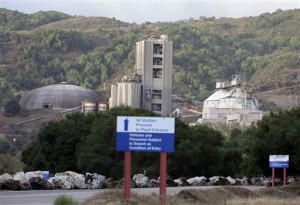“Instead of waiting for the EPA, we’re requiring compliance in 2013″
 That's the triumphant statement of Santa Clara County Supervisor Liz Kniss after a September 19th vote by the Bay Area Air Quality Control District to implement new emission standards for the Lehigh Permanente Southwest Cement Plant in Cupertino, the only cement plant in the San Francisco Area. The standards are as strict or stricter than the slew of new regulations proposed by EPA, and will be imposed by the original EPA deadline of 2013 instead of the expected delayed start date of 2015.
That's the triumphant statement of Santa Clara County Supervisor Liz Kniss after a September 19th vote by the Bay Area Air Quality Control District to implement new emission standards for the Lehigh Permanente Southwest Cement Plant in Cupertino, the only cement plant in the San Francisco Area. The standards are as strict or stricter than the slew of new regulations proposed by EPA, and will be imposed by the original EPA deadline of 2013 instead of the expected delayed start date of 2015.
Kniss, who serves on the district’s board of directors, said the new standards require sharply reduced emissions of various pollutants (NOx, particulate matter, mercury, dioxins, hydrochloric acid, hydrocarbons and ammonia). In the case of each pollutant, the new standard will match or exceed those recommended by the U.S. Environmental Protection Agency, scheduled for implementation in 2015. For example, the allowable average daily emissions of mercury would be reduced from 0.72 pounds to 0.05 pounds – a 93 percent reduction.
“The new (district) regulations make Lehigh Permanente the most tightly regulated cement plant in the nation,” Kniss said. “A 93 percent reduction in mercury is very dramatic.”
Why can't Texas do this as well? It could. If the Texas Commission on Environmental Quality was interested, it could pass it's own set of rules that mimicked EPA's and vote to implement them next year. But that will never happen because Governor Perry is dedicated to regulating industry with ideology, not science. In California, each region has its own air quality board that's in charge of new pollution control measures. That's why this local entity can set cement plant air pollution standards that are now the toughest in the country.
Left unsaid by any of the stakeholders is the added pressure this move in California puts on EPA in Washington DC. The Agency still hasn't finalized the watering down and delay of the new rules, despite a national public hearing in DFW in August, and thousands of submitted comments. The Cupertino plant will be operating under a distinct disadvantage compared to its peers if EPA goes ahead and delays the rules until 2015, while it must meet them by next year.
Meanwhile DFW's air quality – with more cement manufacturing capacity than any other place in the county – is still being held hostage by a state agency and Governor who don't think any more regulations of any kind are needed for the Midlothian kilns. Until we disconnect our fate from Austin's political ambitions, North Texas will never have clean air.
